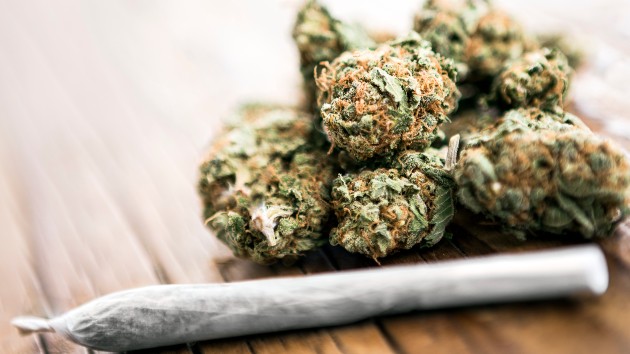Marijuana legalization successes pave way for national conversation on drug laws: Experts
Nastasic/iStockBy IVAN PEREIRA, ABC News
(NEW YORK) — A majority of voters in five states, both red and blue, passed ballot measures that legalized marijuana on Election Day.
This show of support at the polls will put more pressure on other states and the federal government to update its drug policies, according to advocates and experts.
“This indicates that people are frustrated with the outdated drug policies from the 1970s,” Mason Marks, a law professor at Gonzaga University and a fellow in residence at Harvard Law School’s Petrie-Flom Center for Health Law Policy, told ABC News.
In some cases, like New York, elected officials are publicly sounding the call for major policy changes.
In ballot measures passed in New Jersey, South Dakota, Montana and Arizona, residents over 21 will be able to purchase and consume marijuana for recreational purposes. South Dakotan voters also passed a separate measure that legalized medicinal marijuana in the state. Mississippi will also allow adults to use medical marijuana after voters passed an initiative on Election Day.
State legislatures and health departments in the five states will come up with the specific regulations for recreational marijuana next year.
The ballot measures came after marijuana advocates across the country ran campaigns promoting the benefits of legal marijuana by citing the examples from the states that already passed it, according to Matthew Schweich, the deputy director of the nonprofit group the Marijuana Policy Project.
A study released last year by Washington State University found “no statistically significant long-term effects of recreational cannabis laws, or the initiation of legal retail sales, on violent or property crime rates,” in Washington State or Colorado, the first states to legalize recreational pot.
Last year, Colorado, one of the first states to legalize recreational marijuana, generated more than $1 billion in sales from marijuana, which increased the state’s coffers.
“The message that has resonated with voters in all five states was the fact that marijuana legalization is a proven policy and worked successfully in other states,” Schweich told ABC News. “Eleven states had legalized marijuana in the lead up to Election Day, and none of those states have repealed legalization.”
Domino effect?
Marks said the ballot measure successes in the five states could create a domino effect for the surrounded state leaders who have been hesitant to take up the calls for drug policy changes.
“I think other states will definitely follow suit when it comes to legalizing recreational marijuana,” he said.
In New York, leaders from all three branches of government have already begun those calls.
A day after New Jersey passed its ballot measure, New York City Mayor Bill de Blasio called on the state, which currently allows medical marijuana use, to its lead.
“We see it in New Jersey. Now, it’s time for New York State to do it. Legalize marijuana the right way,” he said during his daily news conference.
Sen. Charles Schumer, D-N.Y., also called on the federal government to end its marijuana prohibition “to undo the harms done by the War on Drugs, particularly in Black and brown communities.”
The U.S. Drug Enforcement Agency classifies marijuana as a “schedule 1” drug that is illegal and has “no currently accepted medical use and a high potential for abuse.”
Resistance remains
Marks said while this rhetoric indicates more support for changing the nation’s drug policy, he noted there is still resistance from major groups.
The advocacy group Smart Approaches to Marijuana, which opposes legalization, contended in a statement to ABC News that the legalization efforts have benefited corporate entities “intent on expanding addiction for profit.”
Kevin Sabet, the nonprofit’s president and co-founder, praised President-elect Joe Biden’s marijuana policy, which emphasizes decriminalizing marijuana and expunging criminal records for people who were arrested for possessing small amounts of the drug.
“We are ready to work with the Biden Administration to help promote science-based drug policy that benefits people, not the addiction-for-profit marijuana industry and its investors from Big Tobacco, Big Alcohol, Big Pharma, and others on Wall Street,” he said in a statement.
Marks noted that Biden has come under heavy criticism for his role in passing legislation in the ’90s that punished Americans for minor drug offenses. He added there has been criticism of Biden’s current drug policy proposals, particularly his call for diversion programs where persons arrested for drug offenses are placed in treatment programs instead of jail.
“A lot of advocates say that’s the equivalent to incarceration,” Marks said. “They impact people’s civil rights. It could do more harm than good. If someone doesn’t follow the court’s order for treatment, they can still end up in jail.”
Schweich said Biden’s policy is good for advancing legalization across the country. He noted that the president-elect’s change in drug policies since he left the Senate reflects the new tone among Americans when it comes to drug policies.
“His position represents an evolution that many Americans, particularly those of his age, have gone through,” Schweich said.
Schweich added that Biden’s stance on letting the states decide their marijuana policy will be an important factor in the future of marijuana. This will allow more states to pursue legalization plans and future ballot measures with less concern that the White House will block it, according to Schweich.
“On the state level, we will see more progress regardless of what happens in Congress,” he said. “The marijuana reform movement has very strong momentum.”
Copyright © 2020, ABC Audio. All rights reserved.

